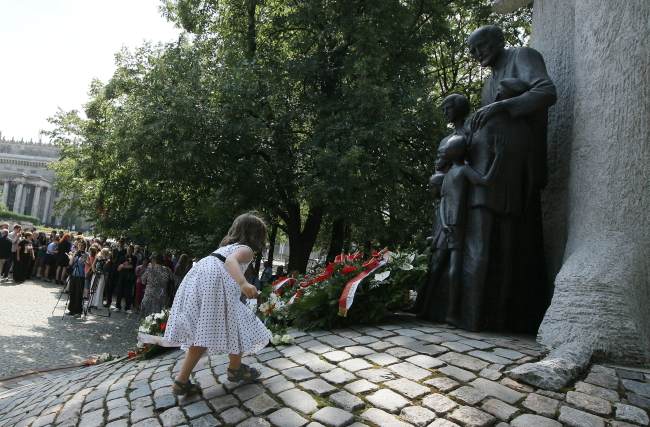Writer and Jewish Ghetto hero Janusz Korczak remembered
PR dla Zagranicy
Nick Hodge
06.08.2012 09:28
A plaque was unveiled in Warsaw on Sunday marking the 70th anniversary of the deportation of writer and doctor Janusz Korczak to the Treblinka death camp.

A child lays a wreath at the Janusz Korczak statue in Warsaw: photo - PAP/Pawel Supernak
Korczak, who has endured as one of Poland's best-loved children's authors, refused to abandon the orphanage that he ran for Jewish children in spite of the Nazi German occupation.
Sunday's ceremony was part of the ongoing Year of Korczak, and was attended by representatives of the Ministry of Education and the Ministry of Culture.
A letter written by First Lady Anna Komorowska, patron of the Year of Korczak, was read out and wreaths were laid at the nearby statue of the doctor.
The plaque was installed on the site of the last location of Korczak's orphanage, where after the war, the communist regime built the towering Palace of Culture and Science. The plaque has been placed by the entrance to the building's noted Puppet Theatre.
Janusz Korczak was born Henryk Goldszmit into an assimilated Jewish family. His novel King Matt the First (1923), about a young boy who is made king, is among Poland's most celebrated works of children's literature.
A committed advocate of children's rights, Korczak founded his orphanage 100 years ago, and its first site was on Krochmalna Street (Jaktorowska Street).
The orphanage had its own newspaper, written by the children, as well as its own parliament and court.
Korczak continued to run the orphanage (at new sites) after the Nazis created the Jewish Ghetto in Warsaw.
He declined help from the Polish underground, and on 22 July 1942, the liquidation of the Ghetto began.
On 5 August 1942, over 6600 people were deported to the Treblinka death camp, among them Dr Korczak and close to 200 of his children. (nh)